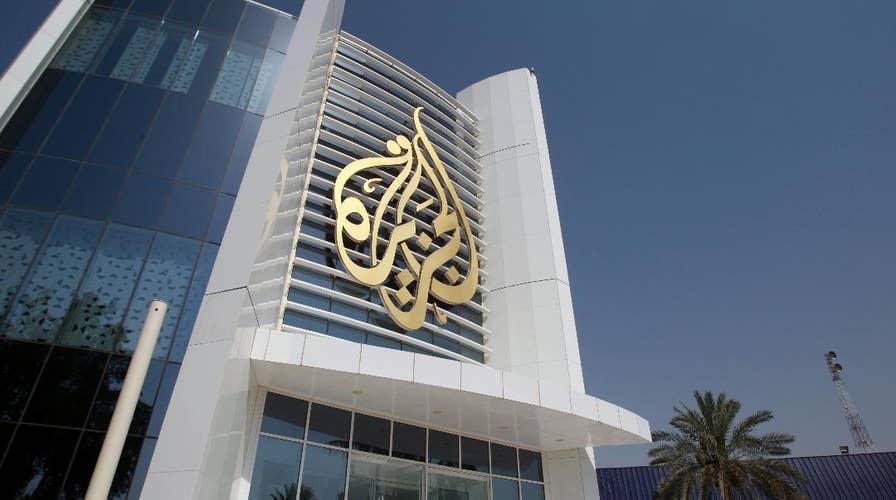Al Jazeera shutdown a demand by Arab coalition: Here’s why
Saudi Arabia, Egypt, the United Arab Emirates and Bahrain are demanding Qatar shut down Al Jazeera. Why is the news network so controversial among the Gulf nations?
JERUSALEM – Israel said Sunday it plans to ban Qatar's flagship Al-Jazeera network from operating in the country over allegations it incites violence, joining Arab nations that have shut down the broadcaster amid a separate political dispute. The news organization, in turn, said it will take legal action.
Communications Minister Ayoob Kara said he plans to revoke the press credentials of Al-Jazeera journalists, effectively preventing them from working in Israel.
Kara said he has asked cable and satellite networks to block Al-Jazeera transmissions and is seeking legislation to ban them altogether.
The minister, a member of Prime Minister Benjamin Netanyahu's Likud Party, gave no timetable for such measures.
Doha-based Al-Jazeera on its English language website condemned the measures as "undemocratic" and said that it will take legal action. It said it will continue operating in the Gaza Strip and the West Bank.
Walid al-Omari, the broadcaster's bureau chief in Jerusalem, said on air that his office has not been informed by Israeli officials of any possible measures the government might take.
Al-Jazeera, a pan-Arab satellite network funded by the Qatari government, already has been targeted by Arab nations now isolating Qatar as part of a months-long political dispute over Doha's politics and alleged support for extremists.
Jordan and Saudi Arabia have recently closed Al-Jazeera's local offices, while the channel and its affiliate sites have been blocked in Saudi Arabia, United Arab Emirates, Egypt and Bahrain.
"Lately, almost all countries in our region determined that Al-Jazeera supports terrorism, supports religious radicalization," Kara said. "And when we see that all these countries have determined as fact that Al-Jazeera is a tool of the Islamic State (group), Hamas, Hezbollah and Iran, and we are the only one who have not determined that then something delusional is happening here."
Israeli officials have long accused Al-Jazeera of bias against the Jewish state. Defense Minister Avigdor Lieberman has likened its coverage to "Nazi Germany-style" propaganda.
Nitzan Chen, director of the Government Press Office, said press credentials are not issued if security officials deem the cards would be "liable to endanger the security of the state." He said "Therefore, I have contacted the security echelon and have requested a professional opinion regarding the Al-Jazeera network."
A decision will be made after receiving that opinion, he said.
The Foreign Press Association, which represents journalists covering Israel and the Palestinian territories for international news organizations, said the move "is certainly a cause for concern." It said it will study the issue and decide how to proceed.
The Committee to Protect Journalists, a New York-based advocacy group, criticized the Israeli proposal.
"Censoring Al-Jazeera or closing its offices will not bring stability to the region, but it would put Israel firmly in the camp of some of the region's worst enemies of press freedom," said Sherif Mansour, the committee's Middle East and North Africa program coordinator. "Israel should abandon these undemocratic plans and allow Al-Jazeera and all journalists to report freely from the country and areas it occupies."
Hamas, the Islamic militant group that rules Gaza, condemned the move. "Al-Jazeera had a big role conveying the Palestinian narrative with a high professionalism," said Hazem Qassem, a Hamas spokesman.
American viewers became familiar with Al-Jazeera after the attacks of Sept. 11, 2001, when its golden-hued Arabic logo became synonymous with video messages by al-Qaida leader Osama bin Laden. That sparked frequent complaints by then-President George W. Bush's administration. The station defended its policy, saying the messages were newsworthy.
Al-Jazeera was the first Arab satellite news channel to offer a range of views outside of heavily censored state media across the region and extensively covered the 2011 Arab Spring. It also was the first Arab-owned news outlet to host Israeli officials and commentators, which some analysts note coincided with Qatar's ties with Israel at the time.

